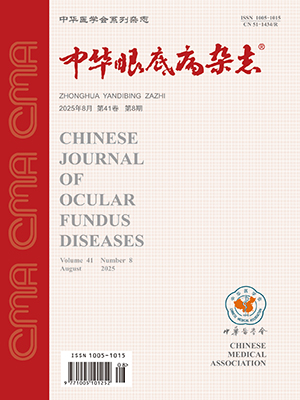| 1. |
Ting DSJ, Foo VH, Yang LWY, et al. Artificial intelligence for anterior segment diseases: emerging applications in ophthalmology[J]. Br J Ophthalmol, 2021, 105(2): 158-168. DOI: 10.1136/bjophthalmol-2019-315651.
|
| 2. |
Lin D, Xiong J, Liu C, et al. Application of comprehensive artificial intelligence retinal expert (CARE) system: a national real-world evidence study[J/OL]. Lancet Digit Health, 2021, 3(8): e486-e495[2021-08-01]. https://pubmed.ncbi.nlm.nih.gov/34325853/. DOI: 10.1016/S2589-7500(21)00086-8.
|
| 3. |
Li Z, Guo C, Nie D, et al. Deep learning for detecting retinal detachment and discerning macular status using ultra-widefield fundus images[J]. Commun Biol, 2020, 3(1): 15. DOI: 10.1038/s42003-019-0730-x.
|
| 4. |
Hogarty DT, Mackey DA, Hewitt AW. Current state and future prospects of artificial intelligence in ophthalmology: a review[J]. Clin Exp Ophthalmol, 2019, 47(1): 128-139. DOI: 10.1111/ceo.13381.
|
| 5. |
Ting DSW, Pasquale LR, Peng L, et al. Artificial intelligence and deep learning in ophthalmology[J]. Br J Ophthalmol, 2019, 103(2): 167-175. DOI: 10.1136/bjophthalmol-2018-313173.
|
| 6. |
Krause J, Gulshan V, Rahimy E, et al. Grader variability and the importance of reference standards for evaluating machine learning models for diabetic retinopathy[J]. Ophthalmology, 2018, 125(8): 1264-1272. DOI: 10.1016/j.ophtha.2018.01.034.
|
| 7. |
Liu Y, Yang J, Zhou Y, et al. Prediction of OCT images of short-term response to anti-VEGF treatment for neovascular age-related macular degeneration using generative adversarial network[J]. Br J Ophthalmol, 2020, 104(12): 1735-1740. DOI: 10.1136/bjophthalmol-2019-315338.
|
| 8. |
Chen JH, Asch SM. Machine learning and prediction in medicine-beyond the peak of inflated expectations[J]. N Engl J Med, 2017, 376(26): 2507-2509. DOI: 10.1056/NEJMp1702071.
|
| 9. |
Ting DSW, Cheung CY, Lim G, et al. Development and validation of a deep learning system for diabetic retinopathy and related eye diseases using retinal images from multiethnic populations with diabetes[J]. JAMA, 2017, 318(22): 2211-2223. DOI: 10.1001/jama.2017.18152.
|
| 10. |
Chen JH, Alagappan M, Goldstein MK, et al. Decaying relevance of clinical data towards future decisions in data-driven inpatient clinical order sets[J]. Int J Med Inform, 2017, 102: 71-79. DOI: 10.1016/j.ijmedinf.2017.03.006.
|
| 11. |
Chang J, Ko A, Park SM, et al. Association of cardiovascular mortality and deep learning-funduscopic atherosclerosis score derived from retinal fundus images[J]. Am J Ophthalmol, 2020, 217: 121-130. DOI: 10.1016/j.ajo.2020.03.027.
|
| 12. |
Rim TH, Lee CJ, Tham YC, et al. Deep-learning-based cardiovascular risk stratification using coronary artery calcium scores predicted from retinal photographs[J/OL]. Lancet Digit Health, 2021, 3(5): e306-e316[2021-05-01]. https://pubmed.ncbi.nlm.nih.gov/33890578/. DOI: 10.1016/S2589-7500(21)00043-1.
|
| 13. |
Poplin R, Varadarajan AV, Blumer K, et al. Prediction of cardiovascular risk factors from retinal fundus photographs via deep learning[J]. Nat Biomed Eng, 2018, 2(3): 158-164. DOI: 10.1038/s41551-018-0195-0.
|
| 14. |
Rim TH, Lee G, Kim Y, et al. Prediction of systemic biomarkers from retinal photographs: development and validation of deep-learning algorithms[J/OL]. Lancet Digit Health, 2020, 2(10): e526-e536[2020-10-01]. https://pubmed.ncbi.nlm.nih.gov/33328047/. DOI: 10.1016/S2589-7500(20)30216-8.
|
| 15. |
Tian J, Smith G, Guo H, et al. Modular machine learning for Alzheimer's disease classification from retinal vasculature[J/OL]. Sci Rep, 2021, 11(1): 238[2021-01-08]. https://pubmed.ncbi.nlm.nih.gov/33420208/. DOI: 10.1038/s41598-020-80312-2.
|
| 16. |
De Fauw J, Ledsam JR, Romera-Paredes B, et al. Clinically applicable deep learning for diagnosis and referral in retinal disease[J]. Nat Med, 2018, 24(9): 1342-1350. DOI: 10.1038/s41591-018-0107-6.
|




